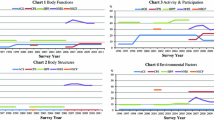Abstract
The first task of the Washington Group on Disability Statistics was to develop a set of questions for use on national censuses. Constraints inherent in the census format placed limits the number and complexity of questions included. It was decided that for each domain of functioning included in that short set, only a single question could be asked. While in some cases a single question can capture all, or most, of the information that is needed to define the continuum of functioning in a domain (seeing for example); other domains of functioning are more complex and require additional questions in order to allow for the establishment of a finer gradient of difficulty from minor to severe.
The challenge then becomes how best to combine elements of functioning described by multiple questions to develop a summary measure that describes the continuum of functioning in these domains.
The analyses that were undertaken to arrive at recommended ways to combine information from multiple domain questions are presented in this paper. The analytic strategy presented here for selected domains, based on a random sample of the US population, will form the foundation for a generalized approach to defining disability using the WG extended set of questions and pave the way for the reporting of comparable data internationally.
Access this chapter
Tax calculation will be finalised at checkout
Purchases are for personal use only
Similar content being viewed by others
Notes
- 1.
The Budapest Initiative (BI), established 2005, is a collaboration of, among others, the World Health Organization (WHO), United Nations Economic Commission for Europe (UNECE), and Eurostat. This consortium was charged with the task of developing a short form questionnaire intended to provide the basis for the collection of comparable standardized information on population health focusing on health state for inclusion in the European Health Interview Survey (EHIS). The BI defines health state in terms of functioning in a core set of health domains.
- 2.
The National Health Interview Survey (NHIS) has monitored the health of the nation since 1957. NHIS data on a broad range of health topics are collected through personal household interviews. Survey results have been instrumental in providing data to track health status, health care access, and progress toward achieving national health objectives.
References
Division of Health Interview Statistics. (2011). 2010 National Health Interview Survey (NHIS) public use data release, NHIS survey description. Hyattsville: National Center for Health Statistics, Centers for Disease Control and Prevention, U.S. Department of Health and Human Services. ftp://ftp.cdc.gov/pub/Health_Statistics/NCHS/Dataset_Documentation/NHIS/2010/srvydesc.pdf. Accessed 28 Oct 2013.
Division of Health Interview Statistics. (2012). 2011 National Health Interview Survey (NHIS) public use data release, NHIS survey description. Hyattsville: National Center for Health Statistics, Centers for Disease Control and Prevention, U.S. Department of Health and Human Services. ftp://ftp.cdc.gov/pub/Health_Statistics/NCHS/Dataset_Documentation/NHIS/2011/srvydesc.pdf. Accessed 28 Oct 2013.
Kessler, R. C., Barker, P. R., Colpe, L. J., et al. (2003). Screening for serious mental illness in the general population. Archives of General Psychiatry, 60, 184–189.
Loeb, M. (2013). Disability statistics: And integral but missing (and misunderstood) component of development work. NJHR, 31(3), 306–324.
Madans, J. H., Altman, B. M., Rasch, E. K., et al. (2004). Washington Group position paper: Proposed purpose of an internationally comparative general disability measure. http://www.cdc.gov/nchs/data/washington_group/WG_purpose_paper.pdf. Accessed 12 Oct 2013.
Miller, K., Mont, D., Maitland, A., Altman, B., & Madans, J. (2011). Results of a cross-national structured cognitive interviewing protocol to test measures of disability. Quality and Quantity, 45(4), 801–815.
NCHS – National Center for Health Statistics. (2011). Data file documentation, National Health Interview Survey, 2010 (machine readable data file and documentation). Hyattsville: National Center for Health Statistics, Centers for Disease Control and Prevention.
NCHS – National Center for Health Statistics. (2012). Data file documentation, National Health Interview Survey, 2011 (machine readable data file and documentation). Hyattsville: National Center for Health Statistics, Centers for Disease Control and Prevention.
UN – United Nations. (2002). Millennium development goals. http://www.un.org/millenniumgoals/. Accessed 18 Oct 2013.
UN – United Nations Enable. (2006). Convention on the rights of persons with disabilities. http://www.un.org/disabilities/default.asp?id=150. Accessed 18 Oct 2013.
UNESCAP – United Nations Economic and Social Commission for Asia and the Pacific. (2002). The Biwako millennium framework. http://www8.cao.go.jp/shougai/english/biwako/contents.html. Accessed 9 Oct 2013.
WHO –World Health Organization. (2001). International Classification of Functioning, Disability and Health: ICF. Geneva: World Health Organization.
World Report on Disability. (2011). World Health Organization, 2011. http://www.who.int/disabilities/world_report/2011/en/. Accessed 6 Oct 2013.
Zola, I. K. (1966). Culture and symptoms – An analysis of patients’ presenting complaints. American Sociological Review, 31(5), 615–630.
Acknowledgements
The author would like to thank Nazik Elgaddal (NCHS/CDC) and Laurie Pratt (NCHS/CDC) for the analytical support they provided to the work presented here.
Author information
Authors and Affiliations
Corresponding author
Editor information
Editors and Affiliations
Appendix 1: Matrix
Appendix 1: Matrix
Washington Group/Budapest Initiative/UNESCAP/UNICEF Question Development Matrix

Rights and permissions
Copyright information
© 2016 Springer International Publishing Switzerland
About this chapter
Cite this chapter
Loeb, M. (2016). Development of Disability Measures for Surveys: The Washington Group Extended Set on Functioning. In: Altman, B. (eds) International Measurement of Disability. Social Indicators Research Series, vol 61. Springer, Cham. https://doi.org/10.1007/978-3-319-28498-9_7
Download citation
DOI: https://doi.org/10.1007/978-3-319-28498-9_7
Published:
Publisher Name: Springer, Cham
Print ISBN: 978-3-319-28496-5
Online ISBN: 978-3-319-28498-9
eBook Packages: Social SciencesSocial Sciences (R0)




